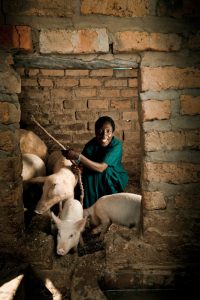(Photography by Gareth Bentley)
Charity Siamacomba
Mwapuna compound, Choma. Farmer, mother, community group member
Charity is 37 years old, lives in Mwapuna Compound with 6 children; the first-born, a girl, used to have a rash and was taken for testing but was found to be negative. Her husband used to work as a guard and they now have a small farm, where they grow maize. She also works from time to time with SWAAZ. Although they do a number of different income generating activities, there is a high level of poverty.
Charity went for VCT as she had had TB and was advised to go; when she tested positive, she was put on TB drugs for a month and then began ARVs. She felt relieved after her VCT counselling because she was sick a lot and wanted to know what was wrong with her so she could get better. She had a problem within the community because people told her once she began taking ARVs she would die.
She says her husband was very hesitant to go for VCT, because he believed that if you found out about HIV you would get very scared and you would die. Eventually they went, but he is negative; he has stayed with her even though she is positive. When she went for VCT, she did not tell very many people in her community. She was advised to become friends with people in her community who are also HIV+ so they can help and support each other. She told her family after a while and they supported her.
She thinks she was in a polygamous marriage. She thinks one of the wives who died used to be away a lot and and it may have been her who brought the disease. Her husband wanted to have a child, so they went to the hospital to see what they needed to do to have a safe pregnancy. They took her CD4 count, which was 150. She conceived after trying 4 times. Then they used condoms after that.
She feels HIV affects women and children most. If a woman dies, her children are left. It affects women because of high poverty levels.
She hasn’t had very many problems with ARVs apart from the first few weeks because she was very weak. Now she can farm and collect wood and water without any problems. She encourages everyone to go for VCT to know their status. She has not taken all her children for VCT and this is because the CD4 count machine has not been working, but she has heard it is working now, so she wants to take them.
Regina Najandwe
Mulendi Village, Choma. Care giver, mother, farmer, wife.
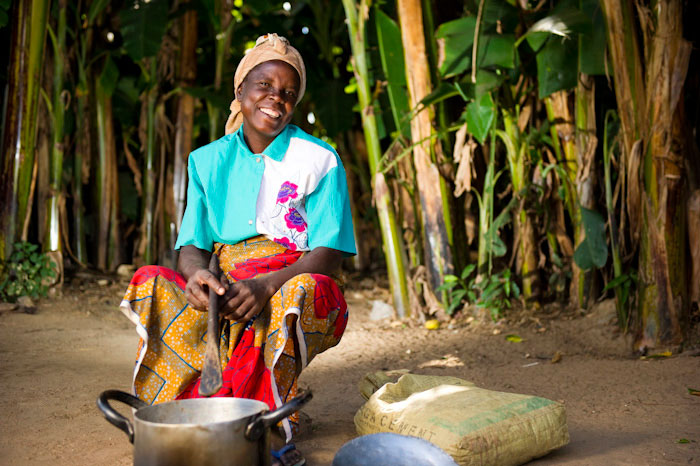
Regina is the first wife of the head man of the village and is 64, has had seven children, one of whom passed away. She is a small scale farmer and grows maize, groundnuts, vegetables and tomatoes. She went for VCT with her friend, was tested and found to be negative. She teaches people about VCT, and goes to the different communities as a care giver for those who are infected. Regina lost her brother to the disease and says that HIV has affected her life greatly.
She feels women are the most infected because they sometimes go out and become promiscuous. But men are also infected; they come with two things – love and infection. Because women bare children, they are more prone to infection because their immune system is low while they are pregnant.
The problem she has with people is the taking of the medication, some people refuse to take it because they think they will become sicker as a result, she says some people just prefer to die. As a caregiver, she distributes condoms in the community; she distributes male condoms mostly, because women don’t like using female condoms. They are too big, and not very nice – like a big plastic bag. People sometimes refuse all condoms because they say sex with a condom is not as pleasurable.
She feels open talking to people about condoms because she says, this is life, it is not taboo for her, even though she is the wife of the village head man – he distributes condoms also. For Regina, sex is no longer just about married people these days, young people are having sex too, it is better than they are informed while they are young, so they know.
Mawaka Swamaza
Chibolia, Lusaka. Business woman, community educator, mother.
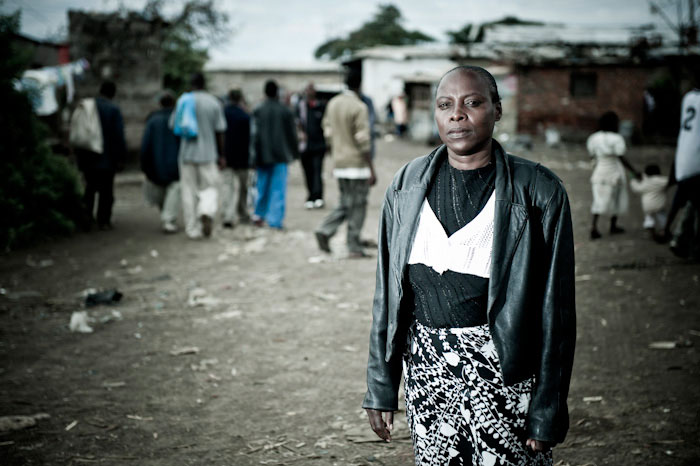
Mawaka Swamaza is 43, has 3 children but looks after other children also including her brother, a grandchild and her niece. She lives in her parents house although both are dead. There are many significant challenges in her community – physical abuse, drug abuse, crime etc., the overall environment is tough. There is no drainage and a lot of people do not even have toilets.
While she does not formally work, she does have a fridge, so she freezes water and sells it on. She sells small bags of frozen water for 100kw for 2 if someone orders it, but if someone just comes and buys, not in bulk, its 200kw. On a good day, she can make up to 10,000w. She gets the water from a tap outside, which has been purified. Her son is a mini bus driver, so he helps to support her also.
She is positive and felt depressed initially until she joined TALC (Treatment Advocacy and Literacy Campaign) where discussion is open and where people support each other. She is the breadwinner of the family, so she educates the children she has living with her to do the same also, just in case something happens to her, so they will be able to survive. Though they depend on her, she teaches them survival skills. She is encouraging people in the community to go for VCT and to take medication.
Her 5 year old daughter was sick, she kept getting oral thrush; when Mawaka was pregnant with her, she did not go for any anti-natal check ups as she did not know that she had to. So when she gave birth, she noticed some symptoms with her daughter. She was advised to go for VCT, and tested positive. She then took her daughter for VCT as her daughter also had TB; as a result, her daughter is now on ARVs.
Her family encouraged Mawaka to get better and take medication, so she could live a normal life. She felt she was ready to get her results, because she had listened to the radio a lot where they spoke a lot about HIV. She felt brave going to get her results, but once she was told, she was very sad and upset. She told her family after 2 months, they understood and her partner was also supportive. They have been together since 2001 but are not married although he is the father of her youngest daughter.
She was married very young and had two of her children, who are 15 and 28, with her husband who died in 2000. Her current partner has not been for VCT. Even though she has asked him, he refuses to go. Her late husband had TB when he died, but she does not know how she became infected. She was told that her CD4 count was not low enough to go on ARVs.
When her daughter takes her ARVs, she becomes very hungry, so she needs a lot of food. Sometimes financially, she cannot cope as it costs a lot to travel to the clinic for check ups so finance is her biggest worry.
She thinks HIV is spreading in the community. She says people are not disclosing their status enough. They know their status, but do not tell their partners, so they then become infected also. There is a lot of problems with alcohol and prostitution in the community and because of this, it is spreading. The poverty levels are too high. Young girls are looking for sugar daddies.
People need economic empowerment. HIV/AIDS can not be reduced because of poverty.
Mawaka thinks women are more affected by HIV than men but they are more open to talk about these issues. Women suffer a lot as they have a lot of responsibilities. She worries for the future – she worries for her children. She encourages them to be careful and go for VCT regularly. She hopes they find a cure for HIV also. She takes her sons for VCT. They are being educated about HIV in school also, as well as home, so they know all the information. She tries to encourage her sons that if they are sexually active, they both need to be tested and to use protection. There are a lot of drugs in the area Chibolia, and no support for people who want to stop. It is up to the individual person to stop. Her brother was on drugs, but not for the past three years.
She says she does not go out much, because there is no where to go, but if she has a good day with work, she will buy some wine. She is muslim.
She thinks there needs to be more support for people who are positive.
Musonda Chela
Kalingalinga, Lusaka. Mother, shop owner, community activist.
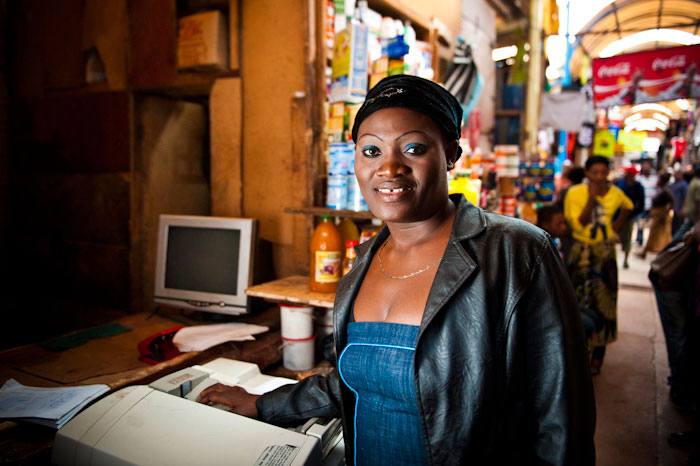
Musonda is 28 years old businesswoman with two children who also works with The local branch of TALC. She has 2 children, 2 boys – 6 years and 6 months old. She lives in Kalingalinga with her children. She has a shop selling stationary and papers ordered from Kamwala, she also does printing and photocopying. She is also involved in cross-border trading, where she gets some groceries and clothes. On a good day she may make 200 pin. In a good month she may make 2 million.
HIV had never really affected her because she never expected to test positive but she has now come to terms with her status and is living positively since 2006. She was married and her husband went for VCT and discovered his status; he did not tell her for a year that he was positive, he was taking medication but she did not know that they were ARVs. Her friends told her, she confronted him and he admitted it. She did not fight with him when she found out, she did not blame him as she herself had had a number of different relationships, so she is not sure if it was him who gave it to her.
After some time, she developed Herpe Zosta and decided to go for VCT, became depressed, went for counselling and is now on medication. She first told her sister and later, the rest of her family. She says this has helped a lot of her family members because, they too were living in denial; her disclosure has encouraged people in her family to go for VCT and start medication.
People in the community are understanding, especially her friends. She has helped people by educating them, especially those in her family. She has met with a number of people from her wider circle of friends who are among high-risk groups to help educate them also. She has helped a lot of her women friends – they meet and go out together. She sometimes distributes condoms in clubs as she knows there are some sex workers there. Musonda thinks it is helpful that she talks to people in the clubs, so she can make them aware of their actions.
She was afraid to take her first son for testing, so her mother-in-law took him because he got sick a lot. She went in secret, and the child was found to be negative. Then when Musonda decided it was time to take him, the mother-in-law told her that she had already taken him, and that he was ok.
She took her baby for VCT when he was 2 months old; when she was 7 months pregnant with him, she started taking some prevention tablets to paralyse the virus, when she went into labour. She forgot to take her tablet, so when she got to the clinic when she was in labour, the nurse gave her two to take. There are a lot of women who forget to take this, then they end up having positive children. She argues that healthcare workers should give pregnant women cards to indicate their status, and if the medication has been given, the nurse will know.
Women are those affected most in the household, men can bring the food, but they don’t talk to the children. Women are more vulnerable to becoming infected as men are not open about their status. Sex is a problem for women, especially if they are HIV+ or their partner is HIV+ – they will continue to infect each other. If a woman insists on wearing a condom, the man will look elsewhere for sex because they prefer ‘live’ sex. Women should not do this just to keep the man happy, but some do.
Josephine Musonda
Volunteer, mother, wife
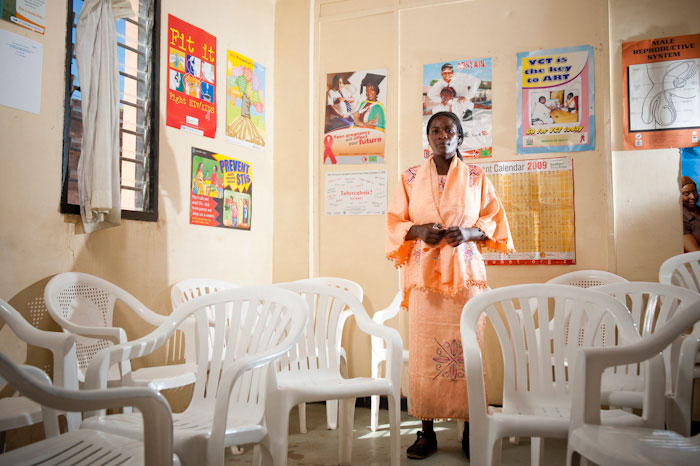
Married twice and divorced, Josephine lives positively with her daughter who is one year and 8 months old and is HIV negative. Her husband works as a security guard and she volunteers at TALC. She helps with the filing, and also gives talks about HIV and AIDS at the clinic in the SOS village and on family planning and on cervical cancer. She encourages people to go for cervical smears, but she has not been herself.
She went for VCT in 2005 as she was constantly having malaria and was often sick. She went to her mother in Kabwe, so they went to a witch doctor because she believed she was bewitched but this had little effect so when she realised there was no change, she went for VCT.
She had been sick with malaria for a year, when she was told she was positive. She was sent to Kabwe General Hospital for further tests but could not afford medication which was not free at that stage. Her mother was very shocked and surprised when she heard about her status; her mother had taken care of her and would bath her when she was sick with Malaria. But when she heard she was HIV+, she did not know what to do, she had very little information, so she would no longer help her to bath.
Josephine asked her mother for money to go to Lusaka with her children, but she was still sick with Malaria because she had not taken medication. At that time in Lusaka, medication was free so she began taking medication at that stage. Her older sister was more understanding and more supportive towards her.
Eventually her mother came to see her, they ate together and she asked Josephine to come home, but she preferred to stay where she was because it was easier to get her medication and check ups if she needed them. Eventually the relationship with her mother improved. Her mother sends relatives sometimes to find out how she is doing.
She also faced stigma from the community, people would point at her and say she is positive and to avoid her in case you might become infected. She joined a support group at Chipata clinic. Through friends she met her current husband; she encouraged him to go to the ART centre in Chipata to be tested and he proved to be positive.
They were together for a month before he went for testing; she told him she was positive; they dated for a year and got married in 2007. She did not know straight away that he was positive. She thinks people in new relationships should disclose their status like she did. She was very open about her status with him because, in case he was negative, she was worried she may be blamed if he became infected. She felt very happy when she found out he was positive.
The children were ok, but her mother was scared when she told them about the marriage. Her mother was worried that she would get stressed and become sick again if she got married. But she explained that she needed a companion.
Through being a member of TALC, she has learned a lot of things; she does public speaking and has learned a lot about HIV and AIDS, treatment as well as about education and communication. She uses her own story to help people. She argues that HIV is not a death sentence.
Women have been disadvantaged because of cultural practices, but they need to be empowered so they can challenge some of these practices. They are vulnerable because of their poor economic status. Most of the time, it is the men who buy the food and provide; men think that because they have this power, they can pick who they want. If women were empowered, it could bring alternative sources of income and they would become less vulnerable.
If a woman dies, sometimes they get the younger sister of that woman as a new wife. If the woman who dies due to HIV related illnesses, the sister is then vulnerable also. Sometimes people are very poor and they stop their daughter going to school so she can get married (sometimes as young as thirteen) so they can get lubula – bride price – for her, and they save the money from school also. Some of these practices need to be stopped.
Sharon Chimbali and Dorothy Subulwa
Forest and Kapulanga Compound, Mongu. Friends and community support workers.
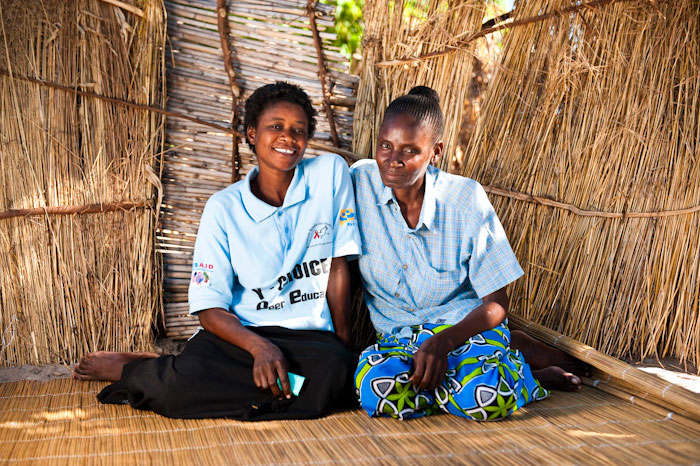
Sharon, the second born of 6 children, is 28 years old, half orphaned with one child – her father died when she was ten. Sharon and her mother sometimes stayed in their village and sometimes with her aunty, where there would be 15 of them in the house. She had to stop school in Grade 9 because they could not afford to keep her in school and she did not have sponsorship. Sharon is now single and living with her daughter and her mother. The father of her daughter Grace has no interest in the child; he saw her when she was 2 months old, but has not seen her since. She took Grace, whom she had exclusively breastfed, for VCT when she was 9 months old and she tested negative.
Sharon is a business woman – she used to brew beer (a local one called Kachasu) but this became too difficult for her dealing with some customers so now she bakes and sells scones by the roadside. Life in her village of Kapulanga is hard, too many people are promiscuous and do not take care of themselves with the result that some girls as young as 12 are having babies.
Dorothy is a 49 year old widow with four children aged 25, 20, 19 and 16. She has one boy who is in college studying computer science and three girls, all of whom are in school. In her community – Forest compound- some people are supportive of those with HIV, some are not and discriminate against because of status.
Previously Dorothy worked in the Ministry of Health as a secretary in Kasempa but when she got TB in 2003 they asked her to stop coming to work. At that time there was no free medication and although she had heard about ARVs, she could not access them because they were very expensive. She knows she became infected through her husband who died in 1998.
Sharon and Dorothy met when they used to be neighbours in Kapulanga compound; at that time, Dorothy was attending a three month course on HIV and advocacy with DAPP (Development Aid from People to People) and Sharon became interested to also learn about HIV/AIDS. Dorothy had observed that Sharon was not looking well, she had a rash and had lost weight. Dorothy kept telling her about HIV/AIDS because at that time Sharon did not know her status. She was encouraging her to go and get tested. But after some time, Sharon went to Lusaka to get married. The marriage did not work out so after a few months, she returned to Mongu and still did not look well. She became sick, her rash developed further and she was admitted to hospital and was tested. She had heard that most people who had Herpe Zosta (her rash) were HIV+, so she was not surprised when she learned that she was positive. Dorothy supported her because she was also positive. For two years Sharon did not tell her family but during this time she began to learn more about HIV; she learned that it is like a lot of other diseases in that it can be managed even if it cannot be cured. Sometimes she can get very tired but has never been bedridden – which was another reason why she wanted to go for VCT.
Dorothy was with Sharon when she was tested. Sharon was relieved when she got her results because she knew what the challenge was and she now knew her status. Sharon joined a support group and both of them have now convinced other people to go for VCT in their communities.
Sharon is unsure how she became infected. Her family did not react badly when they found out about her status, although some people in her community would ridicule her for having to take medication and for being HIV+. Her main challenge is obtaining food, her business is very small, so she does not always have sufficient food. Getting medication is easy for her because she lives near the hospital. Sharon believes women are more affected than men because women are always on the receiving end, which is why they are more vulnerable.
She believes men and women should go for VCT. HIV/AIDS is looked at as a woman’s issue but men need to be encouraged more because the end up going to witch doctors and then getting worse. She thinks it would be good for men and women to go together. She does not feel different from everyone else because she is HIV+, just when she is taking her medication.
Sharon argues that there should be more support for people who are HIV+, in terms of food and micro-finance schemes. HIV is like any other disease and people should not be discriminated in their workplace because of their status. People are still being fired because they are positive. HIV+ people are like every one else, and should be treated the same.
Sharon and Dorothy both argue that everyone should know their status, so that when they are in a relationship they can be safe and protect themselves. They both work with young people in their area to encourage and support them.
Dorothy argues that women are more vulnerable to HIV because in the majority of cases when someone is married, her husband will still have girlfriends, so the chances of them becoming infected is greater. More women go and find out about their status than men would rather carry on and not know. All of her children have been for VCT. All her children are negative.
Mutonga Muketukwa
Itufa, Senanga. Volunteer, Treatment Support worker, Widow.
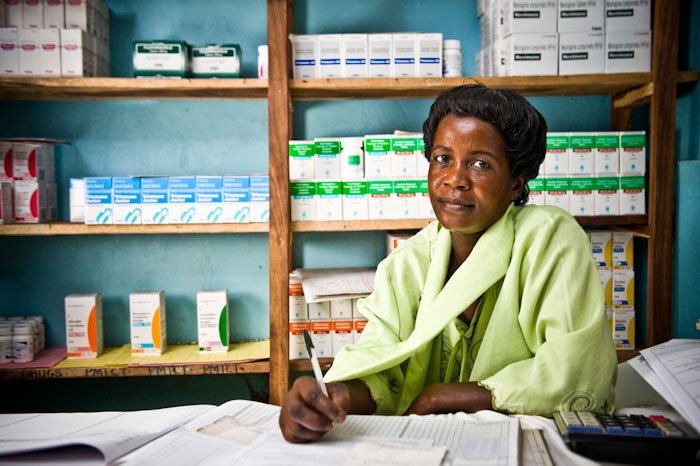
Mutonga is a widow, 43 years old with 3 children – 2 girls and 1 boy. She farms for a living producing rice, casava, maize and vegetables. She also works as a voluntary treatment support worker in the hospital in Itufa; this involves testing clients, counselling, referring them for CD4, and dispensing ARVs. She also works in her community dispensing drugs.
She used to live in Mongu with her husband but he got sick, so they went to Livingstone where he died in 2002; after that life became very hard, so Mutonga moved back to Itufa but she began to get sick, she had body pains all the time, then she got a rash and became bedridden. In September 2006, she went for VCT and was found to be positive and after two weeks on other drugs, she began taking ARVs.
When she found out about her status, she said she lost all interest in her life; she did not want to take ARVs as she felt it was better just to die. When she came back to Itufa, her son was only three years old, so she worried about who would look after him she died. So she decided to try the medication; he gave her the courage to take the drugs. If she did not have him, she would have just let herself die. Her two daughters are still in Livingstone, and have finished grade 12. Her son is in grade 7.
She was very worried about her son being positive because she used to sleep in the same bed as him when she had Herpe Zosta, so she was worried she might have infected him. Knowing her own status, she brought him three times for VCT and he tested negative. She is sure she became infected from her late husband as she has not slept with anyone since him.
Initially, she found it difficult to get her medication because she was bedridden, and it cost 50,000kw to go to get her medication and 50,000kw to come back, this cost made it very difficult for her. She was staying with her mother, who could not afford to give her this money. In Senanga, you might have to queue for about three days to get the medication. After a week on ARVs she began to feel better. Before she took them, her weight was 35kgs. After 3 weeks she was 50kgs. Now it is back up to 65kg. The drugs increased her appetite, which helped her put on weight. She took her daughters for VCT when they came to visit her last year. They are negative. They felt bad when they heard she was positive, but she told them, this is what has happened, and whether you like it or not I am living positively.
In her experience, women are more exposed to HIV, because of poverty and having to exchange sex for food and other goods. Before the programme in the hospital in Itufa began, there was a lot of stigma. But now that they are standing in front of the community, saying they are living positive, and showing people they can be healthy like them too, once they go for VCT and take medication. This encourages people to know their status, and this has helped to reduce stigma also.
As a person who is infected, she urges fellow Zambians to stick to their partners and respect themselves.
She does not think she will be in a relationship again. She does not think she would be happy in another marriage. She is happy to be single and to care for her children.
There are big challenges with reaching people who are far away and stigma is still there in small communities, so people are not going for testing; they lack information. They need to be mobilised better for this.
Davies Mwiya
Itufa, Senanga. Farmer, husband, father.
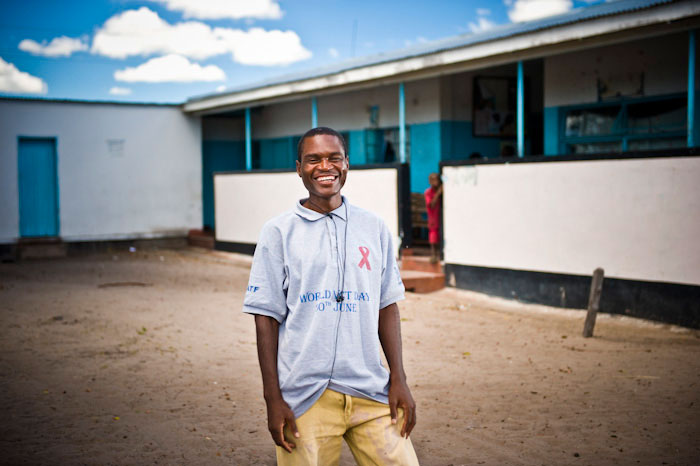
Davies is a farmer growing maize, rice and casava; he did have a fish pond, but he has no fish left; his wife makes scones and sells them. Together they have one child.
Life in Itufa is tough and getting more difficult; the floods and drought hinder the growth of their crops. There is a high prevalence rate for HIV and AIDS in Itufa; it is a small area, with a high number of positive people.
Davies had tested for TB but developed additional problems which required hospitalisation and he was tested for HIV as a result and found to be positive. He said it is something that still confuses him now. He took it as something that can happen to anyone and was not hurt by it. He told his wife and she, in turn went for testing but was found to be negative; they stayed together for 2 years after that. There was confusion among the family because of his status because they said his wife could not stay with him if he was positive. They would not be able to have children because if you have sex with a positive person, you will become infected, and if he infected her, then it would be a crime. His wife said she wanted to stay with him, despite what the family said. She became pregnant, but decided to have an abortion. After that, everything got worse, so they ended up divorcing. She is still negative now.
He was single for six months after this and then met his current wife. She was tested and found to be positive, so they got married and their child, who is now two, is negative. Life has been good since then. Most of the time they use condoms. He is worried that they will re-infect each other if they do not use condoms, especially if there is friction when they have sex.
He thinks he was infected at a very young age. There was a girl he was friends with when he was young and they used to have sex a lot. She lived in Lusaka, so when he went to Lusaka, he would meet with her to have sex. She became very ill, so he believes she infected him. She eventually died of AIDS.
Davies thinks women are more vulnerable, especially rural women; due to the level of poverty women have to exchange sex for goods. Their biological make up and some cultural practices make them more vulnerable e.g. initiation ceremonies where young girls are taught how to please a man but they would not be taught about condoms.
Previously people would go to traditional healers a lot to try and find a cure for themselves, but more and more people are going for VCT and taking ARVs. He is taking ARVs since 2007. Although ARVs are free, people have to spend money they do not have travelling to get the drugs and to pay for accommodation and food. The centre in Itufa was opened for this reason.
Stigma stops people going for VCT, but everyone should know their status. If they are positive, they should get medication. If they are infected, they should use protection, even in a marriage.
More sensitisation is needed especially in terms of initiation ceremonies. They need to change the way they are educating young girls.
Wamatuta Liwanga
Nanyachi Village, Senanga. Chief, farmer, husband, retired teacher.
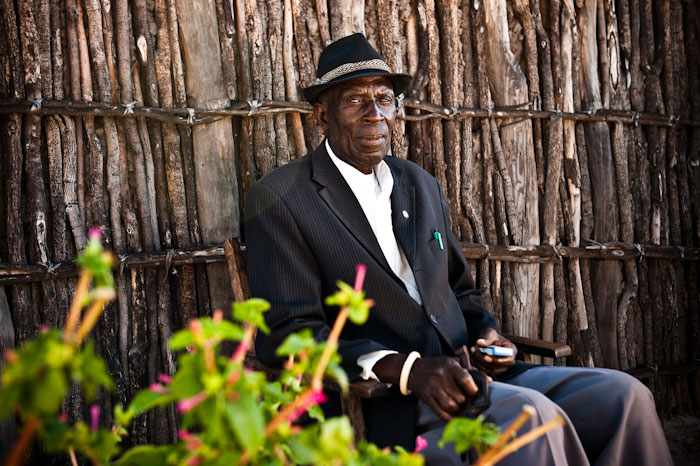
Chief Liwanga was a teacher and retired in 1989, returned to his village and now does some farming. Married in 1961, he and his wife had 12 children but six of them died. Wamututa is now 74 years old. Ten years ago, he was made a chief in the village. He works in Mooyo now as part of the Royal Establishment.
His role in the community as Chief is traditional administration; he works with civic leaders, counsellors and area chiefs who all meet to discuss and arrange matters of local development. Area chiefs deal mainly with customary and traditional matters, ensuring people are behaving as they should, according to local traditions and customs. If people are deemed to be misbehaving, they are called before the leaders and chiefs and are counselled on the right way of living in the community. At local level, people cannot just behave as they like; everyone needs to work together in the community, for example, others people’s property, space and fields must be respected.
HIV/AIDS is a very significant problem in this area, especially now; Chief Liwanga believes he lost three of his children to HIV as it is prevalent in all areas and you will find people with it in almost every home in every village. In order to address the issue, the chiefs and civic leaders in the village call meetings, to inform people on the issue and educate them on what they need to do to protect themselves. The tell them how real HIV is and encourage them to go for VCT rather than waiting. The also advise people to use condoms where appropriate. But a lot of people are Christian, and do not believe in the use of condoms but Mr Liwanga believes the use of condoms is the best way to prevent HIV transmission.
Previously, people were unaware of HIV, but now people have become more informed so it is easier to get them to go for counselling. It takes time, but people are realising that if they are continuously getting sick, they need to go for VCT. Although they do have traditional healers within the community, they discourage people using them if they suspect they have HIV. They can best be used for other illnesses, but not HIV, they know that they cannot cure this as only medical staff can advise effectively on how to live positively.
Traditionally, women do not have land rights within the village. If a woman gets married, the land still belongs to the husband but, if the husband dies, the woman can stay on the land and use the land. In this community, they do not chase women off the land if their husband dies, as happens in other communities. They give the woman the choice to return to her home community with her children or to stay on her husband’s land. They try to encourage them to stay, so the children can be in familiar surroundings and stay near the family. It would be difficult for them to leave after such a long time. A couple of times women have left with their children to go back to their family, but have returned because they could not settle there, so they returned with their children. He finds it hard to understand communities who chase women out once their husband has passed. ‘Death is death, no one is responsible for it’.
While it is easy to get ARVs near here, in Senanga, or Mooyo, but the cost of travelling is too expensive for a lot of people.
Chief Liwanga thinks women are more vulnerable because of poverty but boys are vulnerable also as they can become fishermen and so on. Unless women become educated, it is very difficult for them to get work, or start a business. They can become fishmongers, but if they do not have money, they have to sell their bodies to the fishermen in order to get the fish.
The Chief insists that Zambians realise HIV is real; people must know that HIV is here to stay and they need to take precautions such as going for VCT. Once they do this, the medical staff can assist them prolong their lives in many ways. You cannot tell if someone is positive by looking at them, so people must know their status.
Mirriam Mushetu
Mother, Grandmother, ex-sex worker.
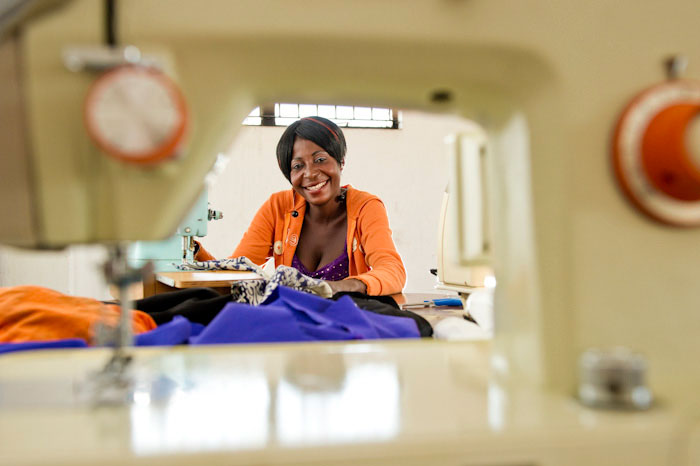
Mirriam is 35 years old.
I used to be a sex worker and went on the street and slept with 6 or 7 men a night. Even if they were married I did not care, I would have sex with them anyway. I did not care about HIV and AIDS and what, I just wanted to have sex.
My home is Solwezi, I became a sex worker there, I then had to move to Ndola, then to Kabwe, then to Lusaka. I was 14 when I became a sex worker, my parents had passed away and was living with my grandmother who could not afford to buy me the nice things my friends had, so I went on the street. I stayed with a women called Mary, who had a house with about 16 young girls living in it. We all used to go on the street. Mary was in charge of us all, she was the head girl, we were treated like her own children. She would care for us and look after us. When it was time to go on the street, she would take us and drop us to where we needed to go. Then we had sex with a lot of men and got a lot of money. When we returned to her, we would give her the money, she knew what to do with the money.
We never cared about a condom. It was up to the client what he wanted. If he wanted sex with a condom, if he wanted sex without a condom, oral sex, whatever. I was happy to do prostitution because for me it was luxury. The agreement was, you get paid first, then have sex. Sometimes the men would beat you and take the money back. When my friends saw the nice things I had, a lot of them then joined me in the sex work. In the past k2000 was a lot of money, you would charge about 50 pin. I stopped prosititution about 2 years ago.
I went for VCT 3 years ago, and was found to be positive. It was easy for me to accept, I did not deny this, I am now taking ARVs, have two children, a girl and a boy, and one grandchild. They have been for VCT, they are both negative. I am in contact with the father and he helps take care of the children.
I would urge women in prostitution to use a condom. At the moment HIV/AIDS is quite high and they are putting themselves at risk. If you go out to work on the street, negotiate condoms. If you have sex with a man who is positive, he will have sex with you, and leave you and you will die.
We are not stationed in one place. Where ever the wind blows we go. There is a place near Mutendere that is popular with truck drivers, so we would go there. They pick you up and they would take you where ever they wanted to go, and you would go because they will pay you to go with them, not matter where it was.
If I found a 14 year old girl who wanted to start doing sex work, like I did at that age, I would take it upon myself to tell her not to, to tell her, there is only death in prosititution. I would really encourage her to go to school and find other ways of surviving.
I thank Tasintha , have learned how to do things like tailoring and learning English, making bricks, chicken rearing. I can do so many things now with my life. I know I am going to be better in life now because of the help I got from Tasintha.
My message to the whole world is that we should not be discouraged if you make a mistake in life. You should move on and look for better things. I used to be a prostitute, I did not care, but now it is different. I am a different person now, I am going to take care of myself and take care of my family and be a new person.
There is no one to blame here, we are all the same, whether man, whether woman, whether married, we are all spreading the virus, you cannot just blame the sex workers for the spread. Even married men and women are spreading the disease.
Janet Ngoma
Mother, member of a support group, ex-sex worker.
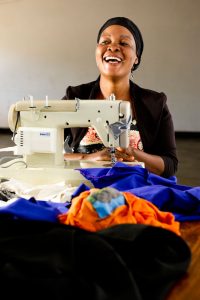
She is 28 years old and became a prostitute in 1990 in the Copperbelt when she was living with her step-mother who used to insist that she bring food in order to support the family.
When my father died, aunty used to send us in to bars to work as sex workers to earn some money. If we didn’t bring food home that day, she would make you sleep on the street, or you would have to sleep with a friend for the night. At times we would go and drink and smoke daga (marijuana) so we would be able to go and do all sorts of things on the road and have sex with the men. I grew up in the Copperbelt and then moved to Lusaka to get away from the things people said about me because of the sex work. I have two sisters, but when dad died, we were separated. My mother was deported back to her home country Mozambique. When I came to Lusaka, I joined my sister, but life was difficult, there were may hardships, so I had to go back on the street.
We were not wanted by our family, so when dad died, we had no where to go. I did not know my family very well. It was a very painful decision to make, but we had to go on the road. It is dangerous. I remember one occasion where my friend was killed and I was left with lots of cuts all over my body, then they dumped me at the graveside.
In the past, I used to fear HIV/AIDS, we all did. Now it is better that we go for testing. We did not know about it, there was no information. But now we know and we are not afraid any longer. I go regularly now for VCT and I know how to take care of myself. I went for VCT last month – that was the 10th time I have been. I am living positive. The first time I went I was afraid at first when I found out, it disturbed my mind, but then I got used to it and it was ok. But then I started taking care of myself and getting better. I am on ARVs now. I have not had any problems with them.
We used to start our work at 16.00, then we would come back around 04.00, but if a customer came before then, you would give them the service that they wanted. There were a mix of clients, Indians, Zambians, whites.
Sometimes I would use condoms, sometimes not; if we used a condom, the price would go low, if we didn’t, the price was high. A lot of men didn’t like condoms. Some would pay you before you had sex, some would pay you after and some would just beat you instead and then run away.
I have a child who is 14 years old girl and in grade 8 in school. She has been for VCT. I manage to survive because Tasintha pay the school fees for me, so my burden is lightened. They (Tasintha) used to get me from the street, but I kept running away. One time I got arrested and then the police beat me. I ended up back in Tasintha and this time I stayed. I have been with them for two years now.
A lot of my friends died on the street. Because I am with Tastintha, I am no longer on the street. I come here during the day and I learn tailoring and other things. The people who say HIV is spread by sex workers – somehow yes, somehow no. It is everywhere. People do not have the knowledge about how to use condoms and prevent this spreading. We have the knowledge now through Tasintha, we know better now.
Even those who are married do prostitution because their husband does not give them any money to feed the children and care for them, so they have to go on the street. Some it is poverty – but for some, it is just fun. I would tell young women to not go into prostitution, they need to find other ways to make money instead. It is not like the 40’s or 50’s where there were not as many diseases, it is worse now.
Eunice Phiri
Teacher, wife.
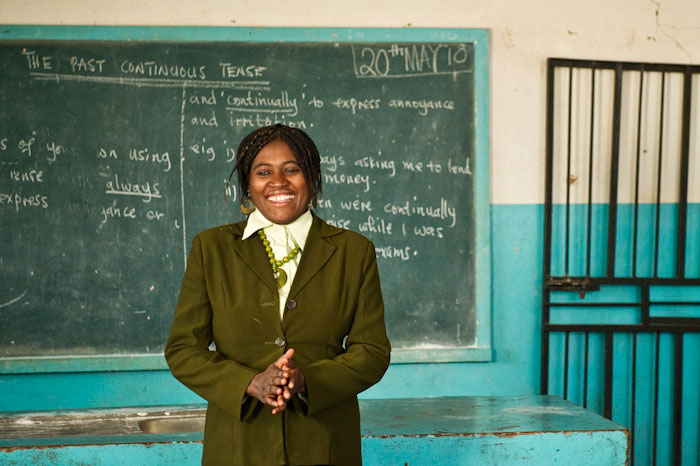
Eunice is 45 years old and is married but has no children. She has been a teacher for 23 years and enjoys it very much because she likes children, she teaches environmental science and is trained to teach maths also. Her challenges as a teacher: there is very little money for equipment; as a science teacher, she has a lab, but no chemicals and apparatus for experiments, so she ends up having to do theory work.
She went for VCT in May 2003 in Lusaka, she did not want to go initially, but her older sister encouraged her saying that she was not well; when the doctor began to counsel her, she insisted she was ready. She was tested and accepted the result then and there. She feels that with or without AIDS, death is there. She was in Lusaka then, so she wrote to her headteacher to tell her that she was positive because she had been on sick leave from school. When she was sick she weighed 68kgs. By the time she got tested she was 54kgs and her CD4 was 72. After two months on medication her weight went back up again to 68kgs and her CD4 increased to 162. ARVs have really helped her. Her weight went from 54kgs at its worst to 80kgs.
She has not experienced any stigma because people see her as an example to others because of how different she was when she came back from Lusaka. She told everybody when she came ‘this is who I am’. There is an association of teachers in Zambia living positively (ATAAZ) so they share experiences and issues.
She is not sure how she got infected, but she is not interested in knowing. What she knows is that she is HIV+ and she must now live like that. She believes that women are more affected by HIV, for example, a woman can be married, her husband is going out to work, and then you find he is going with other women. She does not have the voice to say to him, do not sleep with me, or use a condom. ‘In our tradition, if a man says to have sex, you just have to do it. You can’t say no, so women are more infected. Sexual cleansing is being discouraged now, even by chiefs.’
At our school we do have pupils who are infected; mothers come to tell us that they are infected so sometimes they might be missing from class to go to the hospital to collect drugs and things like this, but we do not ask the pupil about it, how they got infected and such. Some of the younger children may have been infected through mother-to-child transmission, or a blood transfusion. You could never tell.
She has not experienced stigma from pupils or colleagues. There was one teacher she told about her status and he did not believe her, ‘saying you are not positive, I know how positive people look, they are skinny and look sick, you are fine, you have been paid by someone to say you are positive’. But this is the only thing to have happened to her because she has been so open about it all.
Her husband is also positive. She met him after she found out she was positive. He accepted her as she is because they are the same. He is not on ARVs because his CD4 is still high.
She thinks HIV is rising because of people’s lifestyles. You go into town at night and you will see young people sitting in bars. They should be in school but they are in bars instead, so she thinks it is on the increase. She would feel bad if she thought someone thought all Zambians are promiscuous, which is why HIV is spreading, because she is not promiscuous.
HIV/AIDS is real, people should be serious. They should not wait until they are sick, they should not wait until they are carried in a wheelchair. They should go while they still have the energy. People who are HIV+ do not need any special treatment, we are just the same as people who are negative.
Eve Lifunti
Teacher, divorcee, daughter.
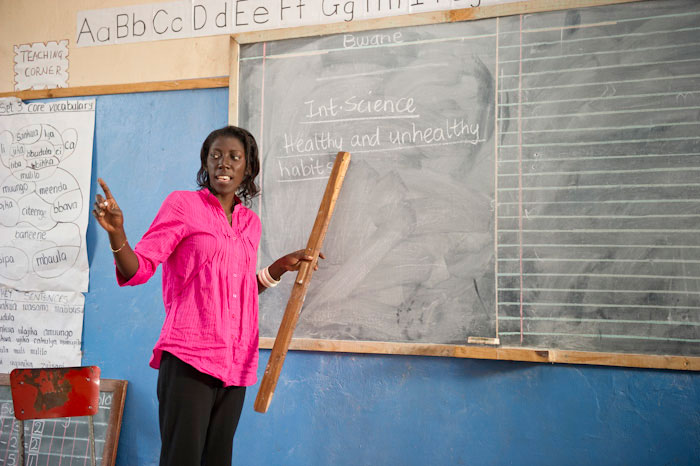
She is 37 years old and single with no children. She is a teacher in Maria Assumpta Basic School in Livingstone, teaching grade 1-7, all of the subjects. The pupils in the school all mingle together, no matter what their background. Life is difficult for the poorer students, but they make ends meet.
I went for VCT in 2004 because I had been sick for a long time; I did not go alone because I was afraid. My dad went to the guidance and counselling officer to get him to come and counsel me. My dad was too shy to talk to me about it, but he knew I needed to talk to someone, which is why he went to the provincial counsellor. The counsellor told me that a family friend had told him they were worried about my health. He did not say who the family friend was, but I agreed to go anyway. After the counselling and that, he told me it was my father. I told my parents about my status 3 days after the results. It was more difficult for my mother to accept, she was very upset. As time went by, she gave me her support.
She is not sure how she got infected. She was married for less than a year. But she divorced her husband because he had other partners; after that she had other relationships, so she cannot be sure if it is from her marriage or from those relationships. She is on ARVs and has had no challenges with the drugs, no side effects, nothing.
She thinks women are more affected. The women are always home, but the men are always going around with other women.
People talk about her because she is not married at her age, but then there are others who say, no she is like this, she does not want to have any relationships. Others understand. ‘At my age people expect me to have children. I think of those challenges I may face if I have a child, so I think being single is ok. At school when I disclosed my status initially, I was worried people were talking about me. But now they come to me and say the envy me because I had the courage to go for VCT, when they don’t have the courage to do the same.
She does sensitisation talks with her colleagues. She shares her story with them. She thinks HIV is reducing in Livingstone. People are more careful now than they were. People have come to know about HIV and AIDS and they take precautions. If she meets a man, and discloses her status, most of the men will withdraw from the relationship.

